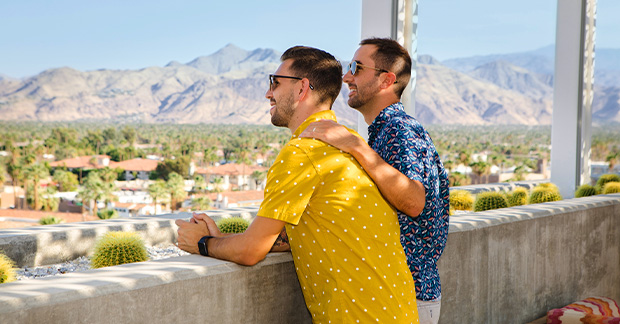New research from Booking.com reveals the rising discrimination faced by British LGBTQ+ travellers when abroad. These increasing challenges call for strategic responses.
The research highlights a growing concern, with significant implications for travel choices and experiences among the LGBTQ+ community.
Rising Discrimination Against LGBTQ+ Travellers
A recent study by Booking.com reveals that 67% of British LGBTQ+ travellers have encountered discrimination abroad over the past year, a significant rise from 55% in 2023. This alarming trend underscores the persistent challenges faced by members of the LGBTQ+ community while travelling internationally. The study further highlights that 68% of individuals who actively advocate for LGBTQ+ rights have experienced similar situations.
Numerous LGBTQ+ travellers, especially those with partners, face discrimination frequently. The research indicates that 64% of partnered LGBTQ+ individuals reported incidents in the last year. Such findings demonstrate that personal relationships may exacerbate the vulnerabilities of these travellers in foreign settings.
Impact on Travel Decisions
The apprehension surrounding potential discrimination is influencing travel choices for many. Booking.com discovered that 61% of LGBTQ+ travellers expect prejudice from fellow travellers, and 62% anticipate it from locals in destinations. This climate of fear results in increased insecurity and self-consciousness, affecting 60% of the respondents while abroad.
Almost half of the respondents chose to cancel trips to destinations perceived as unsupportive of LGBTQ+ rights. However, a proactive approach is evident, with 63% booking trips to LGBTQ+ friendly locations in the past year.
The Importance of Authenticity and Safety
Being able to embrace one’s authentic self is paramount for 70% of LGBTQ+ travellers, surpassing the global average. Within the UK, this demand for authenticity coincides with economic considerations, as 68% prioritise budget-friendly accommodations.
The potential for discrimination is made evident with 27% experiencing negative interactions with fellow passengers during flights. Moreover, 36% expressed concern about being seated next to potentially prejudiced individuals. Such interactions necessitate a strong consideration for safety among LGBTQ+ travellers.
In response to potential threats, many LGBTQ+ travellers find themselves modifying their appearance or behaviour to avoid attracting unwanted attention. Nearly half take such measures, which reflect deep-seated concerns about personal safety during travel.
Creating an alter-ego or adopting culturally sensitive personas has become a strategy for 45% of respondents, with 31% claiming it helps them navigate cultural norms safely. These adaptations highlight the innovative ways LGBTQ+ travellers strive for security.
Despite these challenges, a sense of optimism persists. The report notes that LGBTQ+ travellers increasingly make informed decisions to overcome adversity. The recognition of inclusive practices within the travel industry is a beacon of hope that significantly enhances travel experiences for this community.
Legislative protections in certain destinations reassure travellers, facilitating positive interactions and a sense of belonging. Consequently, 78% of those surveyed feel more comfortable due to improved industry inclusivity.
Interactions with Travel Industry Professionals
The interaction between LGBTQ+ travellers and industry professionals plays a crucial role in their travel experiences. The research shows 85% feel at ease upon checking in at accommodations, with 82% comfortable communicating with hosts and airlines. Moreover, respectful interactions with staff, including tour guides and taxi drivers, are reported by 84% of respondents.
Such positive engagements contribute to a more inclusive travelling environment, encouraging LGBTQ+ travellers to pursue journeys that might have previously seemed daunting. As a result, this community increasingly seeks out destinations known for their supportive stances and inclusive practices.
Desired Improvements in Travel Services
The survey points out a demand for enhanced travel services. A significant 31% of LGBTQ+ travellers call for filters that identify welcoming accommodations. This feature would simplify the process of choosing destinations, ensuring a more accommodating environment.
Booking.com’s Chief Marketing Officer, Arjan Dijk, expressed personal insight into these issues. He acknowledges ongoing challenges but remains inspired by the resilience of LGBTQ+ travellers. “We must remain vigilant and do our part to make it truly easier for everyone to Travel Proud,” he stated.
LGBTQ+ Community Leads in Sustainable Travel
Interestingly, the LGBTQ+ community sets an example in sustainable tourism, as highlighted by research for Sustainable Journeys. This demographic is inclined towards ecologically responsible travel, favouring destinations focused on sustainability. Such preferences indicate a conscientious approach, seeking destinations that advocate for equality and environmental stewardship.
Top destinations for LGBTQ+ travellers prioritising sustainability include Copenhagen, Dublin, and Malta. These locations exemplify cultural inclusivity and commitment to sustainable practices, resonating strongly with the values of this community.
Outlook for the Future
The future of LGBTQ+ travel experiences looks promising, with increased inclusivity and progressive measures being embraced globally. The industry is recognising the importance of offering safe and welcoming environments, which aligns with the values of a growing number of travellers.
While challenges remain, the determined spirit of LGBTQ+ travellers is evident in their adaptive approaches and continued pursuit of enriching travel experiences. This resilience not only contributes to the individual’s journey but also advances the broader movement for inclusivity in travel.
While discrimination poses a real threat, initiatives towards inclusivity offer hope to LGBTQ+ travellers. Continuous progress within the travel industry is crucial.
The determination of LGBTQ+ individuals in seeking supportive environments fuels both awareness and change in travel dynamics.

